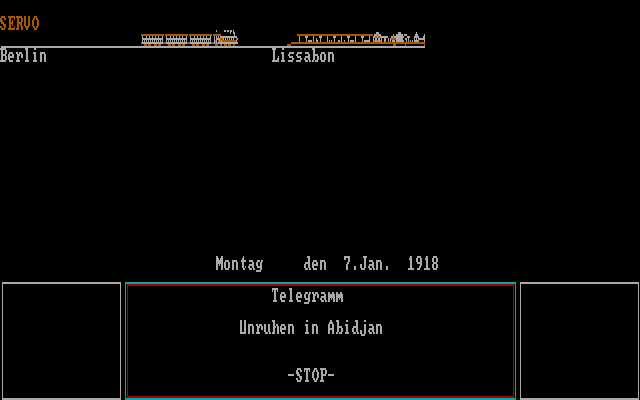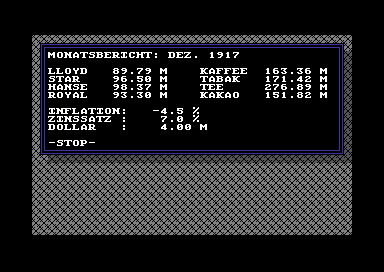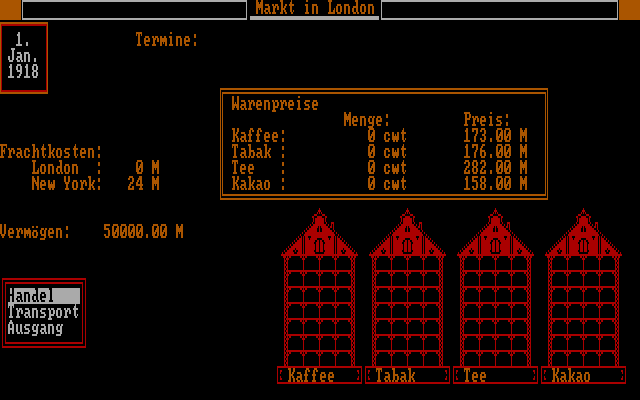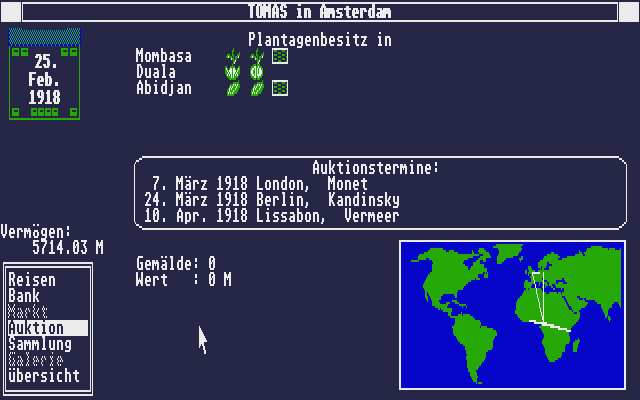Retro Replay Review
Gameplay
Vermeer presents a deeply strategic gameplay experience that marries resource management with a race against time. You step into the shoes of one of Walther von Grünschild’s ambitious nephews, balancing the pursuit of a priceless art collection with the economic realities of the early 20th century. Each day is a round, and you decide whether that round ticks by in five seconds of real time or not at all—allowing you to plan shipping schedules, auction attendance, and horse race wagers with precision.
(HEY YOU!! We hope you enjoy! We try not to run ads. So basically, this is a very expensive hobby running this site. Please consider joining us for updates, forums, and more. Network w/ us to make some cash or friends while retro gaming, and you can win some free retro games for posting. Okay, carry on 👍)
The core loop revolves around four main activities: operating plantations, attending art auctions, developing forgery-detection skills, and employing more shadowy methods such as hiring middlemen or robbers. Plantations in the Third World produce coffee, cacao, tea, or tobacco, which must then be shipped to warehouses in New York or London and sold at the right moment to maximize profits. Meanwhile, auctions offer the tantalizing chance to reclaim a lost Vermeer painting—if you have the cash, the expertise, and the patience to outbid rival nephews and avoid forgeries.
Movement and timing are just as critical as economic planning. You must physically travel from Berlin to colonial plantations, from London to New York warehouses, and from auction houses to racecourses. This on-site requirement forces you to forecast your schedule days in advance. Gamble on horse races to boost your coffers more quickly, but beware of losing streaks. For players who relish logistical puzzles and timing-based strategy, Vermeer’s gameplay loop provides a tense, dynamic challenge that rewards meticulous planning and calculated risk-taking.
Graphics
Though Vermeer debuted in the early 1990s, its visual presentation remains charmingly detailed. The user interface features crisp icons representing plantations, shipping routes, and art halls, all rendered in a palette that evokes period postcards from the 1918–1930 era. The maps of Europe, North America, and the colonial territories are clear and functional, letting you plot your itineraries without squinting at cluttered menus.
In-game screens for auctions and racecourses capture the atmosphere of grand halls and racetracks with simple but evocative backgrounds. Portraits of Walther von Grünschild and his nephews add a personal touch, while text boxes and auction paddles maintain a vintage look reminiscent of early 20th-century design. Even if the graphics don’t compete with modern 3D engines, the aesthetic consistency and attention to thematic detail help immerse you in the world of high finance and fine art.
The plantations and warehouses are depicted through small, animated icons that change state as plantations mature or shipments arrive. These modest animations are more functional than flashy, but they effectively communicate status at a glance. Though some players may yearn for richer visuals, Vermeer’s graphics strike a fine balance between clarity and period flavor, ensuring you always know exactly where your wealth and artworks are in transit.
Story
The narrative framework of Vermeer centers on Walther von Grünschild, a wealthy German art patron whose illustrious collection was scattered across the globe. Upon his return from Berlin, he tasks his four nephews with recovering these masterpieces. The most successful heir will inherit Von Grünschild’s fortune and title, setting up an intense sibling rivalry that unfolds against the backdrop of post–World War I economic upheaval.
Each nephew’s journey begins in 1918 and continues until Von Grünschild’s eventual passing. As you accumulate plantations, attend auctions, and hone your expertise in authenticating paintings, the clock is always ticking. The years slip by day by day, and Von Grünschild’s health gradually declines, creating an underlying sense of urgency. This temporal tension drives the narrative forward, making every business trip and auction bid feel meaningful to your ultimate inheritance.
Secondary story elements emerge through your interactions with art schools, middlemen, and the criminal underworld of Chicago. Learning to detect fakes and deciding whether to undercut rivals with hired guns adds moral complexity to the game’s otherwise transactional storyline. Though Vermeer doesn’t feature voice acting or cutscenes, its text-based events and evolving nephew rivalries deliver a surprisingly rich tale of ambition, risk, and high-stakes competition in the delicate world of art collecting.
Overall Experience
Vermeer offers a robust blend of economic simulation, strategic planning, and period narrative that still holds up decades after its release. Its deliberate pacing—choosing between rapid or leisurely rounds—lets you tailor the experience to your preferred tempo, whether you’re in for a quick auction sprint or a sprawling, weeks-long campaign. The game rewards foresight, adaptability, and a willingness to exploit every available avenue for profit and paintings.
While the graphics and audio may feel dated to modern players, Vermeer’s depth of systems and historical flavor more than compensate. The interplay between plantation management, shipping logistics, auction strategy, and clandestine operations keeps the gameplay varied and engaging. Casual gamers may find the learning curve steep, but strategy veterans will appreciate the game’s layered mechanics and the satisfaction of executing a perfectly timed auction bid or plantation sale.
Ultimately, Vermeer stands as a unique artifact in the history of strategy and simulation games. Its combination of art-world intrigue, colonial commerce, and familial rivalry provides an experience that feels both educational and entertaining. For those looking to immerse themselves in an era of global trade and high-stakes art collecting, Vermeer remains a compelling choice that challenges the mind and stokes the spirit of competition.
 Retro Replay Retro Replay gaming reviews, news, emulation, geek stuff and more!
Retro Replay Retro Replay gaming reviews, news, emulation, geek stuff and more!









Reviews
There are no reviews yet.